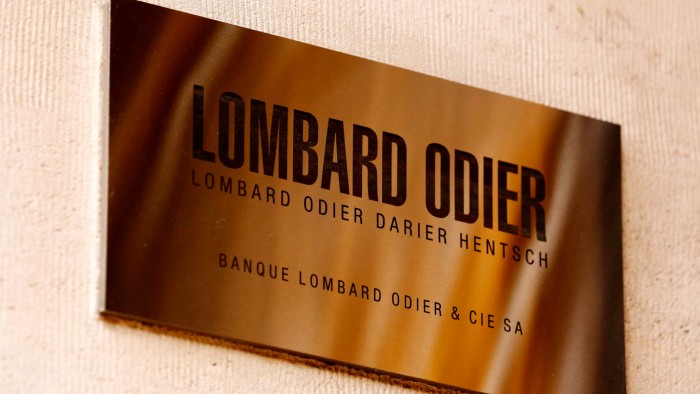Unlock the Editor’s Digest for free
Swiss private bank Lombard Odier and one of its former employees have been charged with aggravated money laundering by Switzerland’s federal prosecutor.
In an indictment filed on Friday, the prosecutor said Lombard Odier — one of the country’s most illustrious financial institutions — had for years played a “decisive role” in helping to conceal the alleged criminal activities of Gulnara Karimova, daughter of the now-deceased president of Uzbekistan, Islam Karimov.
Karimova, who was herself charged in Switzerland in September 2023, embezzled and extorted billions through her control of lucrative Uzbek state contracts and laundered the proceeds through an organisation dubbed “The Office” based in Switzerland, prosecutors allege.
Once named “the princess of Uzbekistan”, thanks to her ostentatious jet-setting international lifestyle, Karimova has been imprisoned in Tashkent since 2014.
An Uzbek court found her guilty of corruption and tax evasion in 2015, handing down a 10-year prison sentence. A second court ruling found her guilty of embezzlement and extortion in 2020, sentencing her to a further 13 years.
Through her lawyer, Grégoire Mangeat, she has denied all the charges against her. Mangeat claimed the judgments in Tashkent were political in nature and came as a result of her father’s death in 2015 and the ascendancy of political opponents.
Before her downfall in 2014, Karimova cut an ostentatious figure on the international scene in Geneva.
She had a short career as a pop singer, taking the stage name Googoosha, after her father’s pet name for her, and recording a sultry duet with French film star Gérard Depardieu. She also launched a jewellery line in collaboration with Chopard and turned her hand to perfumery with her scent Mysteriuese, launched in Paris in 2012.
According to charges brought by Swiss prosecutors last year, Karimova’s vanity projects ran parallel to a vast international criminal enterprise that made her billions, largely by systematically taking bribes from international companies desperate to gain lucrative contracts in Uzbekistan.
The prosecutor’s case against Lombard Odier accuses the bank of failing to comply with anti-money laundering standards and its internal compliance procedures.
In a statement, Lombard Odier stressed that the investigation had begun because the bank had self-reported concerns to Swiss anti-money laundering authorities about its former client more than a decade ago.
“We have taken note of the decision of [the federal prosecutor] to bring charges against the bank for insufficient controls. For the bank, the allegations are unfounded and without merit. The bank plans to defend itself vigorously,” it said.
“The proceedings have been ongoing since [2012] and the bank has always fully co-operated with the relevant authorities.”
Despite its early co-operation, the bank, which traces its history back to the 18th century and proudly boasts that it once played host to Napoleon, was made a criminal suspect in the case in 2016.
A police search in that year of safety deposit boxes in Karimova’s name in the bank’s vaults — a highly unusual occurrence in Switzerland, where bank privacy is usually sacrosanct — turned up a trove of luxury jewellery worth millions, much of it allegedly paid for using Uzbek state funds, as well as numerous documents used by prosecutors to build their case.
A former employee of Lombard Odier has also been charged by the prosecutor. Under Swiss law, the individual’s identity will be kept anonymous until a trial has taken place.
The individual worked for Karimova before being employed by Lombard Odier in 2008.
The prosecutor claims he was responsible for duping the bank’s internal compliance requirements, a process they allege was not hard for him to accomplish. The individual left the bank in 2012, the same year in which the bank’s leadership reported their concerns over Karimova to authorities.
In a statement, the prosecutor said: “Lombard Odier failed to comply with anti-money laundering standards and its own internal guidelines in the opening and management of the nine bank accounts in question.”
The prosecutor’s multiyear investigation “revealed shortcomings in the identification and re-identification of the beneficial owners of the bank accounts in question, the obligation to conduct additional due diligence on higher-risk business relationships, the acceptance and annual review of business relationships with politically exposed persons, the obligation to identify and clarify higher-risk transactions and the bank’s internal organisation,” they added.
Karimova is also connected to Switzerland’s second-largest bankruptcy. In 2010, Zeromax, a Zug-based conglomerate that invested exclusively in Uzbekistan, collapsed and left behind debts of $4.6bn.
The company, whose creditors claim it was used as a front by Karimova, is at the centre of a dispute about her fortune, a large part of which remains frozen in Swiss bank accounts.

